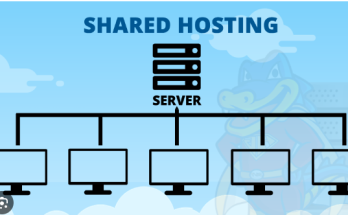Introduction
In the vast realm of web hosting solutions, Google Web Hosting stands tall as a powerful and reliable option for individuals and businesses alike. This comprehensive guide will walk you through the key aspects of Google Web Hosting, shedding light on its features, advantages, and how to get started.
Understanding Google Web Hosting
What is Google Web Hosting?
Google Web Hosting, officially known as Google Cloud Hosting, is a cloud-based hosting service provided by Google Cloud Platform (GCP). It enables users to host their websites and applications on Google’s infrastructure, leveraging the tech giant’s global network and cutting-edge technologies.
Key Features of Google Web Hosting
Scalability: One of the primary advantages of Google Web Hosting is its scalability. Whether you’re running a small blog or a large e-commerce site, Google’s infrastructure allows your hosting resources to scale seamlessly based on demand.
Global Reach: With data centers strategically located around the world, Google Web Hosting ensures low-latency access for your users, providing a smooth and responsive experience regardless of their geographical location.
Security: Google prioritizes the security of its cloud services. Google Web Hosting includes robust security measures, such as encryption in transit and at rest, DDoS protection, and Identity and Access Management (IAM) controls.
High Performance: Leveraging Google’s powerful infrastructure, websites hosted on Google Web Hosting benefit from high performance, quick load times, and reliable uptime.
Getting Started with Google Web Hosting
Step 1: Creating a Google Cloud Platform Account
To embark on your Google Web Hosting journey, you need a Google Cloud Platform (GCP) account. Visit the GCP website, sign in with your Google account, and follow the steps to create your account. Google often provides free trial credits for new users, allowing you to explore their services without immediate cost.
Step 2: Navigating the GCP Console
Once your account is set up, access the GCP Console – the central hub for managing your cloud resources. Familiarize yourself with the console, which provides a user-friendly interface for configuring and monitoring various Google Cloud services, including Google Web Hosting.
Step 3: Creating a Project
In the GCP Console, create a new project for your website or application. A project serves as an organizational unit and helps you manage and monitor resources related to your hosting.
Step 4: Enabling Google Web Hosting
With your project in place, navigate to the “Compute Engine” section in the GCP Console. Here, you can enable Google Web Hosting by creating a virtual machine instance to host your website.
Step 5: Configuring Domain and DNS Settings
To make your website accessible via a custom domain, configure domain settings in the GCP Console. Update your domain’s DNS records to point to the IP address of your Google Web Hosting instance.
Step 6: Deploying Your Website
Once the configuration is complete, deploy your website or application to the Google Web Hosting instance. You can use various deployment methods, including manual upload, version control systems like Git, or automated deployment pipelines.
Optimizing Your Google Web Hosting Experience
Best Practices for Performance
Content Delivery Network (CDN): Implement a CDN to cache and distribute your website’s content globally, further enhancing performance and reducing latency.
Load Balancing: Utilize Google’s Load Balancing services to distribute incoming traffic across multiple instances, ensuring optimal resource utilization and improved reliability.
Security Best Practices
SSL/TLS Encryption: Enable SSL/TLS encryption to secure data in transit. Google provides easy integration with its free SSL certificate service, making it a seamless process.
Firewall Rules: Configure firewall rules to control incoming and outgoing traffic to your Google Web Hosting instance. This helps enhance security by allowing only necessary connections.
Conclusion
In conclusion, Google Web Hosting stands out as a robust and scalable solution for hosting websites and applications. By understanding its features, following the step-by-step guide for setup, and implementing best practices, you can harness the full potential of Google’s cloud infrastructure for your online ventures. Embrace the power of Google Web Hosting and elevate your web presence to new heights.
Unveiling the Power of Google Web Hosting: A Comprehensive Guide
In the ever-evolving landscape of the internet, having a reliable web hosting service is paramount for individuals and businesses alike. Among the myriad of hosting providers, Google Web Hosting stands out as a robust and versatile solution. In this comprehensive guide, we’ll delve into the intricacies of Google’s hosting services, exploring its features, benefits, and how you can harness its power for your website.
Understanding Google Web Hosting
1. Introduction to Google Cloud Platform (GCP)
At the core of Google Web Hosting is the Google Cloud Platform (GCP). GCP is a suite of cloud computing services that provides infrastructure as a service (IaaS), platform as a service (PaaS), and serverless computing. Google Web Hosting, being a part of GCP, inherits the reliability and scalability that are synonymous with Google’s infrastructure.
2. Key Features of Google Web Hosting
a. Scalability and Flexibility
One of the standout features of Google Web Hosting is its scalability. Whether you’re running a personal blog or managing a high-traffic e-commerce site, Google’s infrastructure allows your website to scale seamlessly. The pay-as-you-go model ensures that you only pay for the resources you consume, making it a cost-effective solution.
b. Global Reach
Google has data centers strategically located around the world. This global network ensures low-latency access to your website for users across different geographical locations. With multiple data centers, your site is also more resilient to downtime caused by server failures.
c. Security and Compliance
Google Web Hosting places a strong emphasis on security. The platform incorporates robust security measures, including encryption in transit and at rest, DDoS protection, and identity and access management. Furthermore, Google Cloud Platform complies with various industry standards and certifications, providing a secure environment for your data.
d. Integrated Services
Being part of the Google Cloud ecosystem, Google Web Hosting seamlessly integrates with other GCP services. This includes Google Cloud Storage for scalable object storage and Cloud SQL for managed relational databases. The integration allows for a holistic approach to building and managing your web applications.
Setting Up Your Website on Google Web Hosting
3. Creating a Google Cloud Platform Account
To get started with Google Web Hosting, you need a Google Cloud Platform account. Navigate to the GCP website, sign in with your Google account, and follow the on-screen instructions to set up your account. Google often provides free credits for new users, allowing you to explore the platform without incurring immediate costs.
4. Navigating the Google Cloud Console
Once your account is set up, you’ll access the Google Cloud Console, the central hub for managing your resources on GCP. Here, you can create and configure various services, including Google Web Hosting.
5. Configuring Google Web Hosting
To host your website, you’ll utilize Google Cloud Storage and Google Cloud Storage Static Website Hosting. Upload your website files to a Cloud Storage bucket and configure the bucket to act as a static website host. This straightforward process allows you to take advantage of Google’s global content delivery network (CDN) for faster load times.
6. Securing Your Website with HTTPS
Security is a top priority for Google Web Hosting. You can easily secure your website by enabling HTTPS. Google provides free SSL certificates through its integrated service, making it simple to encrypt data in transit and build trust with your visitors.
Optimizing Performance and Monitoring
7. Utilizing Google’s Content Delivery Network (CDN)
Google’s global CDN is a powerful tool for optimizing the performance of your website. By caching content at various edge locations worldwide, the CDN reduces latency and accelerates the delivery of your site’s assets. Learn how to configure and leverage this feature to enhance user experience.
8. Monitoring and Analytics
Google Web Hosting offers robust monitoring and analytics tools to help you gain insights into your website’s performance. Explore the capabilities of tools like Google Cloud Monitoring and Google Cloud Logging to track metrics, detect anomalies, and ensure your site is running smoothly.
Advanced Features and Best Practices
9. Implementing Serverless Architecture
Take advantage of serverless computing on Google Cloud Platform to further optimize costs and streamline resource management. With serverless options like Google Cloud Functions, you can run code without provisioning or managing servers, focusing solely on your application’s logic.
10. Implementing High Availability
Enhance the reliability of your website by implementing high availability practices. Distribute your application across multiple regions and utilize load balancing to ensure that traffic is evenly distributed. This not only improves performance but also provides resilience against potential outages.
Conclusion
In conclusion, Google Web Hosting, powered by the robust Google Cloud Platform, offers a comprehensive and flexible solution for hosting websites of all sizes. From its global reach and scalability to its emphasis on security and integration with other Google Cloud services, this hosting platform provides the tools needed to create a reliable and performant web presence. By following the steps outlined in this guide, you can harness the full potential of Google Web Hosting for your website, ensuring a seamless and secure online experience for your visitors.



